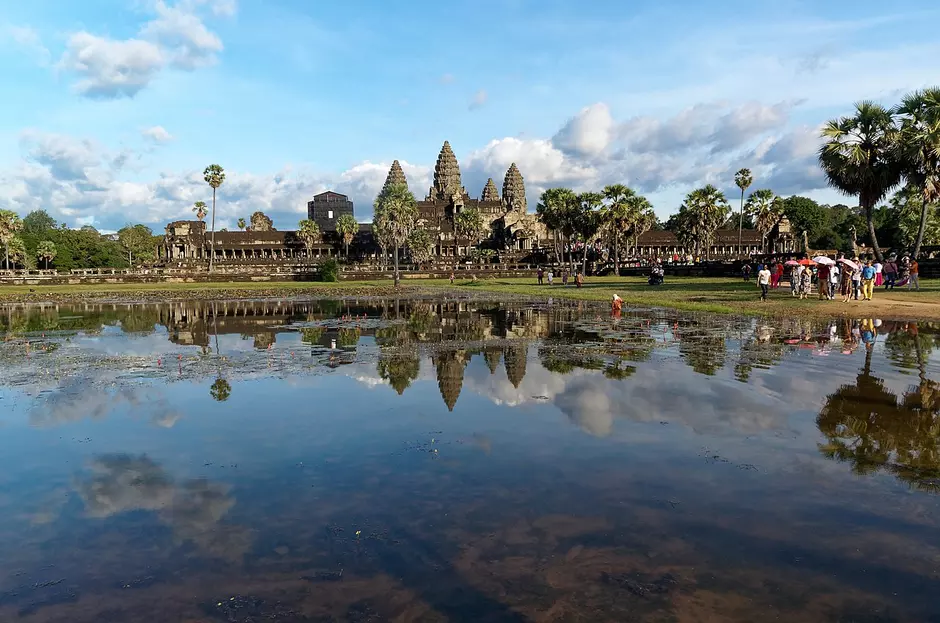
Humanitarian & development
- Location:
Angkor, Siem Reap (Cambodia) - Sponsor:
Bernard Willinger - Grants:
€175,000 at the board meeting on 18 June 2019
€210,000 at the board meeting on 17 June 2024 (over three years)
Project leaders
Association pour la cité hydraulique d’Angkor (Acha)
Association pour la gestion des eaux de la région d’Angkor (Agera)
In Cambodia, the famous Angkor temples are built on sandy layers. The development of mass tourism and the growth of Siem Reap's neighbouring population have increased the demands on the water table, a phenomenon that must be compensated for to maintain the efficiency of the irrigation system designed at the same time as the temples.
The region has also suffered disastrous episodes of flooding, particularly in 2012 and 2013, which have demonstrated the relevance of this hydraulic network in terms of access to water for the population and the stability of the site's monuments.
Apsara, the Cambodian organization that manages the area where this Unesco World Heritage site is located, has called on several international players to rehabilitate the network.
Adapting a remote management and flood control system along the lines of that used for the Bièvre River
An initial project led Veolia Water, the Veolia Foundation and the Syndicat intercommunal d'assainissement de la Vallée de la Bièvre (SIAVB) to finance a feasibility study into the adaptation of a remote management and flood control system initially developed for the Bièvre Valley. This program, christened Pageera, led to the installation of a high-performance solution for flood control and the regulation of water resources for public supply.
In 2019, a program dubbed “Sagera” (for “Système d'aide à la gestion des eaux de la région d'Angkor”) and supported by the Association pour la cité hydraulique d'Angkor (Acha) then the Association pour la gestion des eaux de la région d'Angkor (Agera) sees the light of day.
Convinced of the merits of the French approach to water management, Apsara set out to implement a comprehensive management system throughout its territory. The project involves installing a network of sensors and a hydraulic management system over 400 km², recharging the water tables, improving access to water and sanitation for neighboring populations, and facilitating the development of market gardening.
It is supported in this program by the Agence de l'Eau Seine-Normandie (AESN), the Syndicat interdépartementale pour l'assainissement de l'agglomération parisienne (SIAAP) and, in particular, the Veolia Foundation. Apsara has validated the proposed approach and identified a pilot area of the watershed. It is responsible for financing the civil engineering work required to rehabilitate the canals and locks, and is being supported in modeling, instrumentation and the development of a decision support system based on the latest artificial intelligence techniques.
Enabling as many people as possible to benefit from the program
The Sagera program aims to improve access to water and sanitation for people living in Angkor Park and the Phnom Kulen, the mountainous area that forms the region's “water tower”. Another objective is to encourage the development of permaculture market gardens in the villages of the archaeological park. A Mooc is planned to share mature and accomplished farming experiences, in liaison with Apsara experts. The project also aims to raise hygiene awareness and improve access to drinking water for local populations.
The initial work undertaken has made it possible to collect and regulate tens of millions of cubic metres of water during the monsoon season, and to release it during the dry season in order to feed the rice paddies and significantly increase their production.
One million inhabitants of the surrounding towns and villages are affected by the impact of this project (flood control, drinking water supply), as well as farmers (irrigation) and the country's economy as a whole.
The Veolia Foundation is committed to this ambition, which is at the crossroads of human development and heritage preservation.

